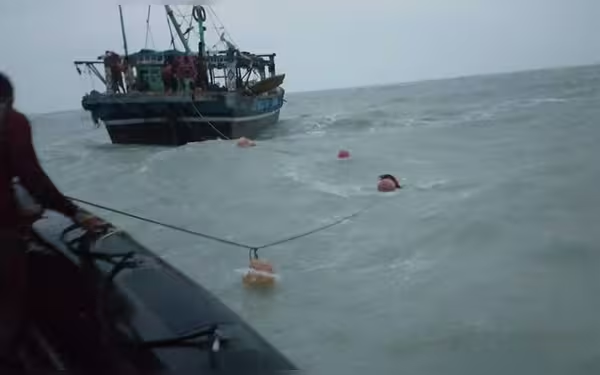Saturday, November 16, 2024 08:44 PM
Unlocking Pakistan's Blue Economy Potential
- Pakistan's blue economy remains largely untapped.
- High port dues hinder trade competitiveness.
- Government action is crucial for maritime sector growth.
 Image Credits: brecorder
Image Credits: brecorderPakistan's blue economy offers vast potential, yet high port dues and mismanagement hinder growth. Urgent government action is needed for progress.
The blue economy represents a vast and largely untapped resource for Pakistan, encompassing all economic activities related to oceans, seas, coasts, and maritime resources. This includes everything from fisheries and aquaculture to marine biotechnology, renewable energy, and maritime transport. Despite the potential for growth and development in these sectors, the government has repeatedly ignored calls to address the many shortcomings that hinder progress.
Currently, a significant portion of global trade—about 70%—is managed by ships, and in Pakistan, this figure rises to an astonishing 95% of trade volume. However, the country has been unable to fully harness this potential due to years of mismanagement, corruption, and poor governance. The situation is exacerbated by exorbitantly high port dues, which make it difficult for Pakistan to compete with neighboring countries like Bangladesh, Dubai, and Saudi Arabia. For instance, the costs associated with berthage, pilotage, and docking at Pakistani ports are higher than those in these countries, creating a significant barrier for businesses.
On July 1, 2023, the Karachi Port Trust (KPT) increased port duties by a staggering 41%, illustrating how quickly and steeply these rates can rise. This sudden increase leaves the economy struggling to find its balance, while port authorities remain overstaffed—a common issue in public sector institutions in Pakistan. This overstaffing is often a result of political culture, where loyalists are rewarded with government jobs, further complicating the situation.
As the economy teeters on the brink of default, it is crucial for all sectors and institutions to perform at their peak. Legitimate businesses and investors can only make noise and request changes, but it is ultimately up to the government to take action. History has shown that countries have gone to war over the control of ports, yet Pakistan, blessed with three major ports, seems intent on squandering this opportunity due to rampant corruption.
There is a wealth of potential in the blue economy, particularly in fisheries, coastal tourism, and marine renewable energy. However, realizing this potential requires a concerted effort from the government, particularly the Ministry of Maritime Affairs. This ministry is well aware of the immediate steps needed to improve the situation, such as addressing corruption and overstaffing, and aligning port duties with international standards.
Engaging experts in the field could help Pakistan take its first steps into the vast ocean of maritime renewable energy, ultimately reducing reliance on fossil fuel imports and benefiting the country as a whole. Unfortunately, despite the urgent pleas from stakeholders, little has changed. Perhaps the dire circumstances will finally compel the government to unlock the benefits of the maritime sector, paving the way for a brighter economic future.
The blue economy holds immense promise for Pakistan, but it requires a shift in mindset and a commitment to reform. By addressing the existing challenges and embracing the opportunities that lie within the maritime sector, Pakistan can not only enhance its economic standing but also secure a sustainable future for generations to come.













